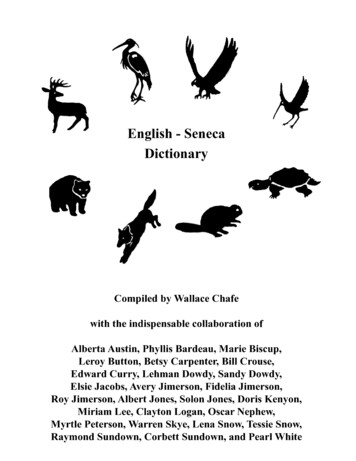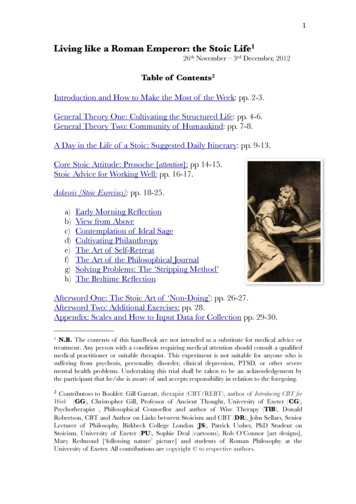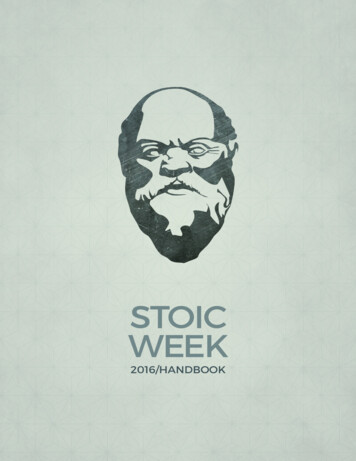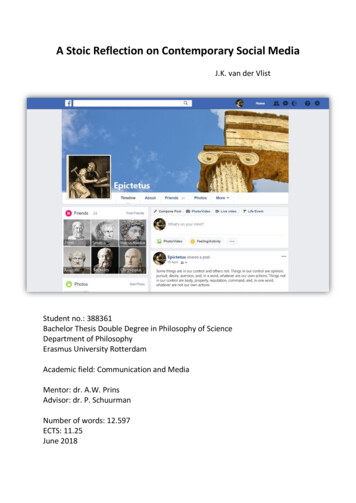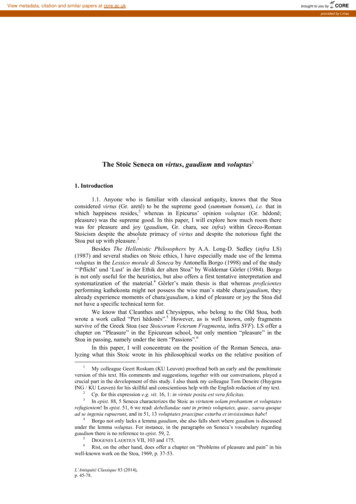
Transcription
View metadata, citation and similar papers at core.ac.ukbrought to you byCOREprovided by LiriasThe Stoic Seneca on virtus, gaudium and voluptas11. Introduction1.1. Anyone who is familiar with classical antiquity, knows that the Stoaconsidered virtus (Gr. aretê) to be the supreme good (summum bonum), i.e. that inwhich happiness resides,2 whereas in Epicurus’ opinion voluptas (Gr. hêdonê;pleasure) was the supreme good. In this paper, I will explore how much room therewas for pleasure and joy (gaudium, Gr. chara, see infra) within Greco-RomanStoicism despite the absolute primacy of virtus and despite the notorious fight theStoa put up with pleasure.3Besides The Hellenistic Philosophers by A.A. Long-D. Sedley (infra LS)(1987) and several studies on Stoic ethics, I have especially made use of the lemmavoluptas in the Lessico morale di Seneca by Antonella Borgo (1998) and of the study“‘Pflicht’ und ‘Lust’ in der Ethik der alten Stoa” by Woldemar Görler (1984). Borgois not only useful for the heuristics, but also offers a first tentative interpretation andsystematization of the material.4 Görler’s main thesis is that whereas proficientesperforming kathekonta might not possess the wise man’s stable chara/gaudium, theyalready experience moments of chara/gaudium, a kind of pleasure or joy the Stoa didnot have a specific technical term for.We know that Cleanthes and Chrysippus, who belong to the Old Stoa, bothwrote a work called “Peri hêdonês”.5 However, as is well known, only fragmentssurvive of the Greek Stoa (see Stoicorum Veterum Fragmenta, infra SVF). LS offer achapter on “Pleasure” in the Epicurean school, but only mention “pleasure” in theStoa in passing, namely under the item “Passions”.6In this paper, I will concentrate on the position of the Roman Seneca, analyzing what this Stoic wrote in his philosophical works on the relative position of1My colleague Geert Roskam (KU Leuven) proofread both an early and the penultimateversion of this text. His comments and suggestions, together with our conversations, played acrucial part in the development of this study. I also thank my colleague Tom Deneire (HuygensING / KU Leuven) for his skillful and conscientious help with the English redaction of my text.2Cp. for this expression e.g. vit. 16, 1: in virtute posita est vera felicitas.3In epist. 88, 5 Seneca characterizes the Stoic as virtutem solam probantem et voluptatesrefugientem! In epist. 51, 6 we read: debellandae sunt in primis voluptates, quae. saeva quoquead se ingenia rapuerunt, and in 51, 13 voluptates praecipue exturba et invisissimas habe!4Borgo not only lacks a lemma gaudium, she also falls short where gaudium is discussedunder the lemma voluptas. For instance, in the paragraphs on Seneca’s vocabulary regardinggaudium there is no reference to epist. 59, 2.5DIOGENES LAERTIUS VII, 103 and 175.6Rist, on the other hand, does offer a chapter on “Problems of pleasure and pain” in hiswell-known work on the Stoa, 1969, p. 37-53.L’Antiquité Classique 83 (2014),p. 45-78.
46W. EVENEPOELvirtus and voluptas. In doing so, I will also discuss gaudium, also known as veravoluptas or true pleasure, as viewed by the Stoa in general and Seneca in particular.We need to realise that Seneca is a Stoic who regularly mentions Epicurus andvoluptas.7 In this way, it seems that Seneca leaves a little more room for pleasures andjoy than his Stoic predecessors.8 However, since more often than not Seneca interprets the term voluptas as physical and sensuous pleasure,9 the Roman very oftentalks about pleasure in a negative way, namely as a passion or adfectus (Gr. pathos), athing well known to Seneca’s readers. Besides, like his Stoic predecessors, Senecawants to avoid paying too much attention to acceptable pleasure.10 Still, the focus ofthis study is precisely the room Seneca leaves for voluptas and gaudium. Apart fromSeneca, I have also paid special attention, whenever it seemed useful, to the information and expressions that Cicero offers with regards to Stoicism and Epicureanism.1.2. Seneca discussed the relationship between virtus and voluptas in depth inone of his so-called dialogues, namely De vita beata (infra: vit.) 611-16. In thesechapters, the philosopher first of all contests Epicurus’ opinion and that of the hedonists. In the previous chapters, gaudium is dealt with, and in the next part of thedialogue the indifferentia are discussed, both themes that are also of importance forour study.12 Besides vit., I have also brought together other passages in which Senecaoffers his opinion on gaudium and voluptas, such as De beneficiis (infra: ben.) IV, 2,1-4 (about the erroneous link between virtus and voluptas in Epicureanism); IV, 13, 12 (Epicurean pleasure vs. Stoic “pleasure”) and VII, 2, 1-4 (about true and falsepleasure); epist. 18, 9-10 (about the moderate pleasure that Epicurus promoted); 21,9b-11 (about Epicurus’ moderate pleasure and different kinds of desire and pleasure);59, 1-4 (about the terms gaudium and voluptas) and 59, 14-18 (gaudium vs. voluptas;praise of gaudium) and the letters 23 (about true joy) and 92 (Stoicism vs.Epicureanism).131.3. At this point, it seems useful to make a first note on Seneca’s terminologyand definitions. As a result of using the word voluptas in epist. 59, 1 to denote the7BORGO (1998), p. 202, counts 337 instances of voluptas in Seneca.See MAURACH (2000), p. 118, n. 126; cp. also p. 119: Seneca takes a less strict positionwhen it comes to preferable indifferentia.9As BORGO (1998), p. 198 states correctly.10Cp. GÖRLER (1984), p. 399, n. 6 and INWOOD (1999), p. 693.11Seneca prepares this part of his text with 5, 4: Nam quod ad voluptatem pertinet.12As in vit. 6-16, virtus and voluptas are also opposed in book II of Cicero’s fin., wherehe criticizes the Epicureanism presented in book I. See e.g. fin. II, 44.13For the heuristics we have used the Concordantiae Senecanae, for instance s.v.gaudium, indifferentia, titillatio and voluptas; also MOTTO (1970), s.v. “Joy”, and s.v.“Pleasure” (cp. also MOTTO 2001), and especially BORGO (1998), for instance s.v. adfectus,libido, luxuria, morbus, voluptas. For the study of vit., KUEN (1994) is available. For the studyof the Stoic tradition, SVF s.v. chara and hêdonê, LS, HAYNES (1962), RIST (1969), p. 37-53(criticizing Haynes), GOSLING – TAYLOR (1982), and especially GÖRLER (1984) are useful. Toboot, Haynes, Rist and Görler mention Seneca several times.8
THE STOIC SENECA ON VIRTUS, GAUDIUM AND VOLUPTAS47pleasure he took in reading a recently received letter from Lucilius, Seneca pauses inepist. 59, 1-414 to consider the usage of the terms voluptas and gaudium. He points atboth the common meaning of these words (59, 1 verbis publicis; 59, 2 vulgo) and theirmore specific, technical meaning in Stoic philosophy (59, 1 significationem Stoicam;59, 2 nostrum album).In common Latin (and in Seneca, for that matter), voluptas can denote all kindsof pleasure or delight (e.g. 59, 1 animi hilarem adfectionem). However, as a technicalterm in Stoic philosophy, according to Seneca voluptas more specifically points at anadfectus, or “a passion” (Gr. pathos) (epist. 59, 4), a vitium (59, 1; cp. ben. IV, 11, 5),a rem infamem (59, 2). Seneca defines this pleasure in 59, 4 as opinione falsi bonimotam, inmoderatam et inmodicam – “it is inspired by an erroneous opinion concerning a false good; it exceeds control and is unrestrained.” This is Seneca’s interpretation of the definition of the pathos hêdonê as alogos eparsis, “an elation of the souldisobedient to reason” (trans. B. Inwood). In this negative sense, voluptas first of allrefers to sensual pleasure and self-indulgence. However, often the word voluptas alsohas a negative connotation when Seneca is not explicitly discussing pathos.Wallowing in pleasure or seeking out pleasure is also called luxuria by Seneca, whichis an unmistakably negative term (cf. vit. 11, 4 and 13, 2; epist. 59, 18 and 116, 3; andMarc. 23, 3).Virtuous conduct brings about a certain joy (epist. 59, 1-4), which Senecasometimes calls voluptas too (e.g. vit. 9, 1-2; cp. epist. 18, 10). Elsewhere, he(polemically) refers to this joy as vera voluptas (vit. 4, 2).15 Yet, Seneca’s technicalterm for the joy connected with virtuous conduct is gaudium (Gr. chara; epist. 59, 2and 14 sq.; vit. 4, 5). Alternatively, he also uses laetitia for this joy (cf. vit. 4, 4; 15, 2and 22, 3; cp. epist. 72, 8).16 Seneca defines gaudium in 59, 2 as animi elatio suisbonis verisque fidentis, “joy is an elation of the soul –a soul that trusts in the goodnessand truth of its own possessions”, which is his interpretation of the definition of charaas eulogos eparsis – “a rationally justifiable uplift (in the soul)” (cp. B. Inwood).Reproachable voluptates are called falsa gaudia in epist. 59, 18. The opposition gaudium – voluptas (e.g. vit. 3, 4 and epist. 59, 14-18) is already present inChrysippus, namely as chara – hêdonê.1714Cp. BORGO (1998), p. 200.Or as solida voluptas (Helv. 5, 5). Cp. ben. VII, 2, 3-4. In epist. 122, 6 vera voluptasrefers to something else.16Seneca uses laetitia differently than Cicero, see also notes 17 and 18 infra. The article“laetitia” of the Thesaurus Linguae Latinae, vol. VII.2.2. (1979), col. 875, does not at allacknowledge this difference in doctrinis philosophorum.17See GÖRLER (1984), p. 400. Cp. also CICERO, Tusc. IV, 13: nam cum ratione animusmovetur placide atque constanter, tum illud gaudium dicitur; cum autem inaniter et effuseanimus exultat, tum illa laetitia gestiens vel nimia dici potest, quam ita definiunt: sine rationeanimi elationem. Cicero uses laetitia gestiens where Seneca uses voluptas or luxuria. See alsonote 18 infra. Chrysippus sometimes used hêdonê in a positive sense, according to GÖRLER(1982), p. 399, n. 6, who refers to DIOGENES LAERTIUS VII, 103. Compare this practice with thefact that he sometimes spoke of “something good” when he meant a preferable indifferent15
48W. EVENEPOELIn his philosophical works, Seneca has used voluptas and gaudium both in thetechnical and in a more general sense. As can be expected, one finds the technical,Stoic meaning especially where the opposition voluptas – gaudium is being discussedin depth.181.4. Before continuing, I wish to stress the fundamental nature of thedifferences between what Epicurus and the Stoa taught regarding virtus andvoluptas.19 There is more to the matter than the well-known fact that the Stoa sawvirtus as the supreme good and Epicurus saw voluptas as the supreme good.For Epicurus, pleasure is a matter of central concern, while in the Stoa pleasureis mostly considered in the context of the struggle against the passions. For Epicurus,pleasure is a feeling that every living creature seeks by nature as the supreme good.Pleasure presents itself to the senses as a thing that is evidently good.20 Every pleasureis a good thing an sich, although reason does teach that it is not wise to pursue eachand every pleasure.In their polemical discussion with the Epicureans, the Stoics state that everyliving creature initially seeks self-preservation (conciliatio; Gr. oikeiosis) and thatpleasure, Gr. hêdonê, is (only) a by-product (Gr. epigennema) of actions that realisesuch self-preservation. Pleasure that exceeds the boundaries defined by nature is or iscaused by an erroneous judgment, and is a bad thing (hêdonê s.s.; pathos). The joythat comes from practicing virtue is or is caused by a correct judgment, and is a goodthing (chara, one of the eupatheiai). In this way, pathos and chara are opposed to eachother as alogos and eulogos eparsis.21thing, see FORSCHNER (1981), p. 171-172 and note 76. See also PLUTARCH, Stoic. rep. 1048aand INWOOD (1999), p. 693. For the terminology of the classic Stoa, see GÖRLER (1984).18For the terminology of Cicero, see KILB (1939), GRIMAL (1978), p. 34-41 and alsoBORGO (1998). In Tusc. IV, 66 Cicero writes that he has distinguished gaudium and laetitia inview of his own didactic intentions: he uses gaudium for joy and laetitia (gestiens) forexaggerated joy; see also fin. III, 1 ; III, 35 ; and Tusc. III, 23 (see ThlL s.v. laetitia and KILB1939). In the case of Seneca, GRIMAL (1978), p. 332 erroneously opposes laetitia instead ofvoluptas (hêdonê) to gaudium (chara). For gaudium as joy connected to virtus, see e.g. CICERO,fin. V, 69. In Cicero perturbatio animi is the usual expression for pathos (see especially fin. III,35), in Seneca the term used for pathos is adfectus (see especially ira II, 3, 1 and epist. 75, 1012). In epist. 75, 10-12 Seneca describes the difference between adfectus and morbus, seeBORGO (1998), s.v. adfectus, p. 15.19According to Seneca, Stoicism and Epicureanism are opposed to each other on threeessential points: regarding the supreme good, a thing discussed in our paper (virtus vs.voluptas), regarding the divine (a central role for the deity vs. no interference of the gods inhuman affairs), and regarding social and political engagement (engagement vs. no participationin political affairs). For Seneca succinctly on Epicureanism, see epist. 90, 35: Non de eaphilosophia loquor quae civem extra patriam posuit, extra mundum deos, quae virtutemdonavit voluptati.20See CICERO, fin. I, 30.21The thesis that pathos and chara are an erroneous and correct judgment respectively, orthe result of an erroneous c.q. correct judgment, is tied up with the Stoa’s monistic perspectiveon the human soul. Some Stoics (e.g. Chrysippus) have stated that pleasure is a judgment,
THE STOIC SENECA ON VIRTUS, GAUDIUM AND VOLUPTAS49According to Epicurus, the senses determine that voluptas is the supreme good,while for the Stoa knowledge of the supreme good is always a matter of the animus.22Seneca offers his opinion on this issue in epist. 124, 2: Quicumque voluptatem insummo ponunt sensibile iudicant bonum, nos contra intellegibile, qui illud animodamus.232. Seneca on Epicurus’ teachings about pleasure2.1. In the following part of this study, I want to point out what Seneca wroteabout Epicurus’ teachings regarding the supreme good and how he criticized theGreek philosopher. In Seneca’s epist. 18, 9 Epicurus is called ille magister voluptatis,and in epist. 92, 25 Epicureanism is dubbed ipsa officina voluptatis!In vit. 6-16 Seneca presents Epicurus’ position through the interventions of afictitious opponent and his own reactions. However, as previously announced, I willalso include other passages from Seneca’s philosophical works in this discussion andother parts of my study.2.2. According to Seneca, epist. 21, 10, the entrance of Epicurus’ gardensfeatured a sign that said: Hospes, hic bene manebis, hic summum bonum voluptas est.Moreover, in epist. 99, 28 Seneca says to Epicureans: Unum bonum nostis,voluptatem, unum malum, dolorem. We need to realise that Epicurus thought ofhêdonê (voluptas) in the broad sense of the word. The fact that he called pleasure thesupreme good ties in with his view on human nature. In his view, we know fromexperience that from birth every living creature seeks pleasure (and wishes to be freeof pain).I immediately add to the previous point that for Epicurus moral excellence,especially prudentia (Gr. phronêsis), “prudence, wisdom”, along with practicing theother cardinal virtues, was indispensable to attain pleasure.24 In vit. 7, 1 we read:Itaque negant posse voluptatem a virtute diduci et aiunt nec honeste quemquamvivere ut non iucunde vivat, nec iucunde ut non honeste quoque (cp. vit. 10, 1 and15, 1).25 Indeed, ben. IV, 2, 1 is quite clear about Epicurus’ teachings: non estvoluptas sine virtute (see also epist. 85, 18 infra sub 3.2).All things considered, the pleasure that Epicurus himself envisaged, was, asSeneca has regularly pointed out (e.g. vit. 13, 1), a moderate pleasure, tailored to whatnature needs, which is, both in Epicurus’ and Seneca’s opinion, not much. We canothers (e.g. Zeno) that it is the result of a judgment. See GOSLING – TAYLOR (1982), p. 419 andp. 423, and also FORSCHNER (1981), p. 138. Seneca claims that pleasure is based on a judgment(see e.g. epist. 59, 4).22Cp. e.g. CICERO, fin. I, 30; II, 36; II, 91; III, 3, and also BRENNAN (2003), p. 277.23Cp. INWOOD (2007), ad Sen. epist. 124, 2-6 (p. 364-368). Cp. also vit. 2, 2: animibonum animus inveniat, and epist. 66, 35: Ratio ergo arbitra est bonorum ac malorum.24EPICURUS, Ad Menoeceum (infra: Men.) 132.25EPICURUS, ibid.; cp. Kyriai doxai (infra: KD) 5. Compare Seneca’s expression toCicero’s in Tusc. V, 26: negat quemquam iucunde posse vivere, nisi idem honeste, sapienteriusteque vivat. Cp. e.g. also fin. I, 57 and II, 51.
50W. EVENEPOELgather this much from the discussion of several quotes from Epicurus (“extras”) thatSeneca uses to finish off epist. 2-29;26 see e.g. 2, 5; 4, 10 magnae divitiae sunt legenaturae composita paupertas; 18, 9-10; 21, 10; 27, 9. Epicurus considers moderationand frugalitas necessary things; more generally speaking, he advocates a rational,calculating attitude towards pleasure.27Not all pleasure is equally desirable; hence the necessity to make rationalchoices and to distinguish between different kinds of enjoyments.(1) In his presentation of Epicureanism and his criticism on the school (books Iand II of De finibus bonorum et malorum respectively; infra: fin.), Cicero deals atgreat length with the fact that in Epicurus’ opinion hêdonê or voluptas did not onlyinvolve pleasure in the common sense of the word, but also the absence of pain (fin. I,37 etc.). According to Cicero and Diogenes Laertius, whose views are usually takenover in modern manuals, Epicurus supposedly distinguished between kinetic andstatic or katastematic28 pleasure.29 Pleasure in the common sense of the word is,according to Cicero, a pleasure residing in motu –it is “kinetic”, while the otherpleasure is one residing in stabilitate– it is “static”.30 Static pleasure amounts to theabsence of pain, in particular the absence of hunger, thirst and cold. Kinetic pleasurecan be defined as pleasure involving active stimulation, for instance the pleasureexperienced in food or drink, or sexual intercourse. Kinetic enjoyments (and sensuousenjoyments in particular) are more powerful than static pleasure, but last less long,and the desire for them involves a bigger dependency on Fortuna than static pleasure,which is therefore deemed preferable by Epicurus.31In epist. 18, 9-10 Seneca praises Epicurus for staying out of Fortuna’s reachby choosing for moderate pleasure, namely the absence of hunger and thirst. In vit.7, 4 Seneca only discusses pleasure residing in motu, “in movement”, stating that it isnot a stable good. Without any doubt, Seneca is targeting pleasure in the common26In the “extras” of epist. 2-29 Seneca regularly cites Epicurus to underscore his ownpositions.27See EPICURUS, Men. 129-130. Cp. CICERO, fin. I, 32: ratione voluptatem sequi, andSENECA, De otio 7, 2: nec ille tertius, de quo male existimare consensimus, voluptatem inertemprobat sed eam quam ratione efficit firmam sibi.28In Greek “katastematikos”, i.e. “in rest”.29One can read about this distinction of Epicurus, for instance, in BRUNSCHWIG – SEDLEY(2003), p. 161. Several studies refer to DIOGENES LAERTIUS X, 136, and also to CICERO, fin. II,9. Cicero, according to STOKES (1995), p. 145, is our clearest source for this distinction.NIKOLSKY (2001), however, contends that the distinction in question was only later ascribed toEpicurus. STOKES (1995) has also studied what Epicurus and Cicero wrote in this respect; he isconvinced that Epicurus himself must have made the distinction katastematic –kinetic (see e.g.p. 159). Still, NIKOLSKY (2001) did not use STOKES (1995) for his study.30For the terminology, cp. e.g. CICERO, fin. II, 6; II, 9: restincta enim sitis stabilitatemvoluptatis habet, illa autem voluptas ipsius restinctionis in motu est; fin. II, 16: in motu vs. instabilitate, or also fin. II, 75 and 77.31LS vol. 1, p. 123. For Epicurus’ preference for static pleasure, cp. CICERO, e.g. fin. I, 38and II, 10. In Tusc. III, 47 Cicero wrote regarding Epicurus: summamque esse voluptatem nihildolere.
THE STOIC SENECA ON VIRTUS, GAUDIUM AND VOLUPTAS51sense of the word here.32 The reason that Seneca, unlike Cicero, only speaks ofpleasure in this sense here, is probably the fact that in opposing voluptas and virtus heis mainly concerned with pleasure in the common sense of the word. Also mentioningpleasure as the absence of pain in the polemical discussion in vit. would unnecessarilycomplicate and weaken his (relatively short) argument.(2) We know33 that Epicurus made a second distinction between three differentkinds of pleasure: enjoyments that are natural and necessary, in particular food anddrink; enjoyments that are natural but not necessary, e.g. sexual intercourse; andenjoyments that are neither natural nor necessary, e.g. a statue, which produces glory.The last kind consists of hollow, worthless enjoyments. The philosopher is contentwith pleasures that are natural and necessary, which for that matter can be obtainedwithout much difficulty.This distinction is partly found in Seneca’s epist. 21, 9b-11. According toSeneca, Epicurus does not ingest food to stimulate his senses, but to alleviate hishunger, for he is content with naturali et gratuito remedio (§10). In hac voluptateconsenui, as Epicurus once put it. Seneca clarifies this kind of enjoyment (in hacvoluptate) in the following manner: De his tecum desideriis loquor quae consolationem non recipiunt, quibus dandum est aliquid ut desinant (§11). In this case,(natural and necessary) needs are at stake that cannot be ignored and therefore shouldbe attended to in order to stop them. The final part of §11 also deals with such needs;the belly cannot be ignored, but can be content with little, or, one has to give the bellywhat it needs, not what one can give. The sentence de his. desideriis is followed byNam de illis (sc. desideriis) extraordinariis quae licet differre, licet castigare etopprimere, hoc unum commonefaciam: ista voluptas naturalis est, non necessaria.34In epist. 4, 10 we learn that, according to Epicurus, the only thing naturedemands is non esurire, non sitire, non algere. And to this he adds: parabile est quodnatura desiderat et adpositum;35 cp. gratuito in epist. 21, 10.(3) Finally, Epicurus also distinguished between spiritual and physical enjoyments,36 preferring the former over the latter, not only because the mind allows us torelive enjoyments from the past when experiencing less pleasurable moments37 and toconsider the possible enjoyments in the future, but also because there is great pleasurein (rationally) conquering our fear of death and of the gods.38 In vit. 6, 1 Seneca32See GRIMAL (1969), ad loc. That this was the common meaning of the word voluptascan be gathered, for instance, from CICERO, fin. II, 8: Omnes enim iucundum motum, quo sensushilaretur, Graece hêdonên, Latine voluptatem vocant. See also fin. II, 28 and II, 77.33See EPICURUS, Men. 127 and KD 29; also CICERO, fin. I, 45; II, 26 and Tusc. V, 93.34In contrast with Cicero (fin. II, 26), Seneca did not criticize this classification of thepleasures.35See EPICURUS, Men. 130. Parabilis is also used with regards to natural and necessaryenjoyments in CICERO, Tusc. V, 93 and with regards to natural riches in fin. II, 91.36Cp. DIOGENES LAERTIUS X, 136.37For instance, in DIOGENES LAERTIUS X, 22 we hear that on his deathbed Epicurus stillfully enjoyed the philosophical conversations he had previously had with Idomeneus.38See EPICURUS, Men. 131. Cp. CICERO, fin. I, 40-41.
52W. EVENEPOELmentions that the Epicurean’s spiritual enjoyments consist in the memory of pastphysical pleasure and the prospect of future physical pleasure.39 Yet whichever wayyou look at it, Seneca narrows down the meaning of spiritual pleasure for Epicurushere.The absence of physical pain and of the disturbance of peace of mind (in particular fear) (ataraxia), which are essentially two kinds of static or katastematicpleasure, are the highest pleasures for Epicurus40 (corpus sine dolore animus sineperturbatione [Seneca, epist. 66, 45]; cp. 66, 47: corporis quietem ab omniincommodo liberam et animi remissionem bonorum suorum contemplationegaudentis.)412.3. In epist. 124, 6 sq. Seneca criticizes the fact that Epicurus entirely baseshis ideas of the supreme good on the behaviour of babies, without sufficiently takinginto account what it means to be an adult human being.42Even though spiritual pleasure is more important than physical pleasure forEpicurus, the latter is still prominent in his writings about pleasure.43 It is undoubtedlybecause Seneca puts physical pleasure at the root of the problem, that he focuses onthis kind of pleasure44 in his criticism of Epicurus.45 It is no coincidence that in vit.5, 4 the point of departure for his attack on Epicureanism is precisely physicalpleasure.46 Also typical is the following turn of events in vit. 6, 1. When a fictitiousopponent suggests that Epicureans recognize spiritual pleasures as well, Senecazooms in on the arbitral role played by the animus regarding (physical) voluptates inthe Epicurean interpretation, mocking the pleasure the Epicurean animus finds in39Cp. CICERO, Tusc. V, 96: spiritual pleasure ranks higher than physical pleasure, becausethe latter is linked up with the present, while the former is found in past, present and future.40EPICURUS, Men. 128; cp. CICERO, fin. I, 38.41Cp. about Epicurus, KUEN (1994), p. 373-376, and also LS vol. 1, p. 112-125, andBRUNSCHWIG – SEDLEY (2003), p. 160-162.42The Stoics too depart from the analysis of a baby’s behaviour for the development oftheir doctrine of oikeiosis. They are of the opinion that man’s first impulse is self-preservation.However, for determining the supreme good, the Stoics also take into account what characterizes an adult human being.43LS vol. 1, p. 124. In this way, Epicurus taught, for instance, that spiritual pleasure hasits roots in physical pleasure. See e.g. CICERO, fin. I, 55 and II, 98 (Cicero says to theEpicurean: negas animi ullum esse gaudium, quod non referatur ad corpus); cp. e.g. also fin. II,106 and 107, and III, 1.44Besides, Cicero too emphasizes the importance of physical pleasure in Epicureanism;see Tusc. III, 37 and 50. Cp. also CICERO, fin. III, 1: Etenim sit impudens (sc. voluptas), sivirtuti diutius repugnet, aut si honestis iucunda anteponat aut pluris esse contendat dulcedinemcorporis ex eave natam laetitiam quam gravitatem animi atque constantiam.45In his philosophical writings, Seneca repeatedly expressed his appreciation for Epicurusas a person, and for his teachings about paupertas. Although Epicurus regarded pleasure as thesupreme good and therefore could be accused of mollitia, Seneca still considered him a braveman (fortis). In epist. 92, 26 the Epicureans are called degeneres et humillimae mentis. Cp.Cicero’s attitude towards Epicurus in fin. II, 99.46See also KUEN (1994) ad loc.
THE STOIC SENECA ON VIRTUS, GAUDIUM AND VOLUPTAS53reliving and anticipating physical pleasures. The fact that Seneca is primarily talkingabout the soul’s attention to physical pleasures is very clear from his turn of phrase,which includes luxuria; eis omnibus quae oblectare sensus solent; corpus, andsagina. This means that the reader can get the erroneous impression that Epicurusreduced pleasure to physical pleasure.The kind of link between virtus and voluptas defended by Epicurus was totallyunacceptable for Seneca. The former’s view causes virtus to be lowered to the position of handmaiden of voluptas (virtus voluptatum ministra, ben. IV, 2, 1), which isput before everything else (epist. 90, 35; 92, 9 and ben. IV, 2, 1-4). Just how offensiveSeneca would have found this opinion is clear from Cleanthes’ visual representationof Epicurus’ teachings, in which Voluptas sits on a throne surrounded by virtutes asher servants (see Cicero, fin. II, 6947). However, for the Stoa in general and Seneca inparticular, it is beyond question that virtus should play the leading role.Besides, voluptas cannot be the supreme good, since pleasure is a transientthing, which tunc cum maxime delectat extinguitur (vit. 7, 4). It is a pseudo-good,which exists in motion according to Seneca (cf. supra 2.2.), and is therefore per definition unstable (vit. 7, 4). Moreover, how could voluptas be the supreme good whenEpicurus himself is forced to admit that voluptas needs to be controlled by ratio andvirtus, while nothing can be greater than that which we accept to be the supreme good(vit. 11, 2 and 14, 1)?In any case, virtus and voluptas differ fundamentally. In Seneca’s view, theyare inconvenientia –“irreconcilable things” (see vit. 12, 3) (cp. diversa and dissimiliain vit. 7, 1 and 3). Indeed, some things are pleasant, but not of high moral standing,while other things are of high moral standing, but not pleasant (vit. 7, 1).48 Virtus is athing of high moral standing; one finds it in temples, at the forum, in the senate andon the battlefield, while (physical or sensuous) pleasure is a base thing, voluptas beingfound in brothels and bars (vit. 7, 3). A telling passage is ben. IV, 2, 4: Non indignor,quod post voluptatem ponitur virtus, sed quod omnino cum voluptate!49 In epist. 92,9-10 Seneca compares the (Epicurean) combination of virtus and voluptas with themonster Scylla, as described by Virgil in Aen. III, 426-428, and in 92, 10 he calls it adiscors. iunctura. Some lines later, in epist. 92, 24, we read that virtus does not evendeign to look at pleasure!50Many hedonists –for whom only physical pleasure is of importance51according to Seneca in vit. c. 13– do not really know Epicurus’ philosophy and onlyuse it to cover up their own quest for pleasure (vit. 13; cp. epist. 21, 9 and const.15, 4). Turning Epicurus’ interpretation of the link between voluptas and virtus upsidedown, the hedonist seems to think that a life full of pleasure will automatically be amorally excellent life; see vit. 12, 3: quia scit
46 W. EVENEPOEL virtus and voluptas.In doing so, I will also discuss gaudium, also known as vera voluptas or true pleasure, as viewed by the Stoa in general and Seneca in particular. We need to realise that Seneca is a Stoic who regularly mentions Epicurus and voluptas.7 In this way, it seems that Seneca leaves a little more room for pleasures and joy than his Stoic predecessors.8 However .


